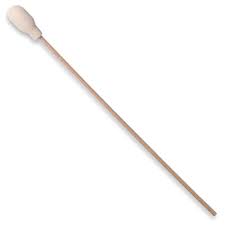swab
英 [swɒb]
美 [swɑːb]
- n. 药签,[外科] 拭子;医用海绵,纱布;拖把,擦帚;无赖
- vt. 打扫,擦拭;涂抹(药)于
星级词汇:

中文词源
swab 拖把,抹布,清洗,擦拭,拭子,药签
缩写自 swabber,拖把,尤指清扫甲板的拖把,来自荷兰语 zwabber,来自 Proto-Germanic*swabb, 拖,可能来自拟声词,模仿拖地的声音。后用于指医用的拭子,药签,且成为主要词义。
英语词源
- swab (n.)
- 1650s, "mop made of rope or yarn," from swabber (c. 1600) "mop for cleaning a ship's deck," from Dutch zwabber, akin to West Frisian swabber "mop," from Proto-Germanic *swabb-, perhaps of imitative origin, denoting back-and-forth motion, especially in liquid.
Non-nautical meaning "anything used for mopping up" is from 1787; as "cloth or sponge on a handle to cleanse the mouth, etc.," from 1854. Slang meaning "a sailor" first attested 1798, short for swabber "member of a ship's crew assigned to swab decks" (1590s), which by c. 1600 was being used in a broader sense of "one who behaves like a low-ranking sailor, one fit only to use a swab." - swab (v.)
- 1719, possibly a back-formation from swabber (see swab (n.)). Related: Swabbed; swabbing. Related: Swabification "mopping" (1833).
权威例句
- 1. to take a throat swab
- 用棉签从咽部采集化验样品
- 2. Yet I kind of think I've - yes, I've seen the swab.
- 不过,我好像记起来了 —— 是的, 我见过这狗东西.
- 3. Administer the salve to the sunburned area with a cotton swab.
- 请用棉药签把药膏敷在晒伤的地方.
- 4. We have to swab out the sitting - room before your mother comes back.
- 我们得在你妈妈回来之前把客厅擦洗干净.
- 5. She used cotton wool to swab her wounds when they bled.
- 伤口渗出来的血水需要棉花来抹掉.